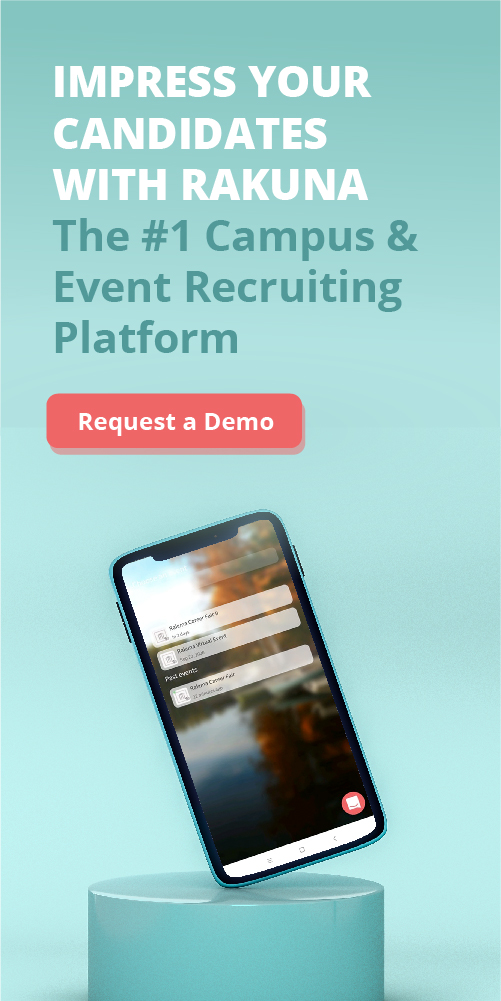Studies from The National Association of Colleges and Employers (NACE) show that companies with structured internship-to-hire programs see higher retention rates and stronger long-term performance than those hiring externally.
For global businesses, campus recruiting isn’t just a hiring tactic—it’s a long-term talent pipeline strategy. Yet, many organizations still underestimate the power of early-career hiring, missing out on the next generation of skilled, tech-savvy, and adaptable professionals.
Whether you’re a seasoned talent acquisition leader or a new recruiter navigating your first career fair, having a structured and scalable campus recruitment strategy is essential for hiring success.
In this guide, we’ll break down the fundamentals of campus recruitment and share proven strategies to help you attract, engage, and retain top student talent. Let’s dive in.
What Is Campus Recruiting ?

Campus recruiting is the strategic process of identifying, engaging, and hiring college students and recent graduates for internships, co-op programs, and full-time roles. For organizations, this isn’t just about filling entry-level positions—it’s about securing high-potential talent early, shaping future leaders, and maintaining a strong talent pipeline.
A well-executed campus recruitment strategy provides businesses with a competitive edge by:
-
Building brand recognition among students before they even enter the workforce.
-
Fostering long-term talent pipelines to fill critical roles faster.
-
Tapping into fresh perspectives from students trained in the latest industry trends and technologies.
The Many Approaches to Campus Recruiting
Traditionally, campus hiring meant setting up booths at career fairs, conducting on-campus interviews, and forming partnerships with university career centers. While these strategies are still effective, the recruiting landscape in 2025 and beyond has and will open up more diversified, tech-driven approach.
Companies that want to build a strong presence among students now use:
-
AI-powered talent platforms like Handshake, WayUp, and RippleMatch to directly connect with students before they even apply.
-
University career services partnerships to gain exclusive access to job boards, networking events, and student resume books.
-
Social media and employer branding on platforms like LinkedIn, TikTok, and even less traditional outlets like Discord, and Reddit to engage students where they spend time online.
-
Student ambassador and future job competency programs to create organic brand advocacy within universities.
💡 For even more approaches to campus recruiting, check out these 19 campus & job hiring event ideas to win talent.
Virtual Hiring and AI-Powered Screening
While virtual hiring events surged during the pandemic, they’ve stuck around because they’re efficient:
-
AI-powered talent platforms like Handshake, WayUp, and RippleMatch to directly connect with students before they even apply.
-
University career services partnerships to gain exclusive access to job boards, networking events, and student resume books.
-
Social media and employer branding on platforms like LinkedIn, TikTok, and Discord to engage students where they spend time online.
-
Student ambassador programs to create organic brand advocacy within universities.
AI in Recruiting: Opportunities & Challenges
AI is making campus hiring faster and more efficient—but it’s not without risks. Some candidates have started using AI-generated deepfake technology to manipulate video interviews, altering their voices or appearances to pass screenings. In early 2025, several universities in the UK reported cases of applicants attempting to game the system using AI-powered face-swapping tools.
To combat this, recruiters must implement enhanced verification measures like:
-
Multi-step authentication for video interviews.
-
AI-detection software to flag manipulated responses.
-
More live, interactive assessments to ensure authenticity.
Why Soft Skills & Cultural Fit Still Matter
Despite all the tech advancements, recruiters agree that AI can’t replace human judgment when assessing soft skills and cultural fit. While AI tools can scan resumes for keywords and rank candidates based on skills, they can’t fully evaluate qualities like adaptability, teamwork, and emotional intelligence.
Many organizations now incorporate structured behavioral interviews, case studies, and group exercises into their hiring process to assess these critical competencies.
💡 Grab this guide on optimizing your interview process for culture-fit and culture-add
The Responsibilities of a Campus Recruiter

A campus recruiter wears many hats—talent scout, brand ambassador, event organizer, and data analyst—all to ensure the best and brightest students transition smoothly into the workforce. Their role is crucial in building a pipeline of future professionals who align with the company’s culture and goals.
Here’s a deep dive into what a campus recruiter actually does:
1. Developing & Maintaining University Relationships
Building a strong presence on campus is crucial for long-term recruiting success. Campus recruiters need to:
-
Establish long-term partnerships with universities, student organizations, and career services offices.
-
Gain insider access to resume books, exclusive job boards, and alumni networks.
-
Partner with faculty members and student leaders to co-host workshops, case studies, or industry talks that subtly promote their company as a top employer.
💡 Example: Google and Meta have mentorship programs like the CSRMP with top universities, providing real-world projects that later feed into their recruitment pipeline.
2. Planning & Executing High-Impact Campus Events
Career fairs remain a key part of campus recruiting, but in 2025, engagement requires more than just a booth. Companies must invest in hybrid, interactive experiences to attract digital-native Gen Z students.
-
Virtual Recruiting Events: AI-powered networking platforms like vFairs and Hopin offer real-time chatbots that answer FAQs and pre-screen candidates during virtual career fairs.
-
Gamified Challenges & Hackathons: Tech companies like Microsoft and IBM host case competitions where winners get fast-tracked through the hiring process.
-
Social Media Takeovers & Live Q&As: Handshake and LinkedIn Live are increasingly used for employer branding and engaging students before an event.
3. Employer Branding: Making Your Company Stand Out
With Gen Z job seekers prioritizing values, flexibility, and career growth, employer branding has never been more crucial. Recruiters now act as brand ambassadors, showcasing company culture through:
-
Authentic Employee Stories: Featuring young employees in “Day in the Life” videos on TikTok, Instagram, and LinkedIn.
-
Transparent Salary & Career Pathing Info: Gen Z expects clear compensation details and career growth plans upfront.
-
Sustainability & DEI Initiatives: out of 22,800 respondents in 44 countries, When evaluating a possible employment, 72% of Gen Zers and 71% of millennials believe environmental qualifications and policies are crucial in Deloitte’s Annual Gen Z and Millennial Survey
💡 Example: Patagonia actively recruits students who align with their sustainability mission, using branding that emphasizes eco-conscious work.
4. Identifying & Engaging Qualified Talent
Traditional resume filtering is no longer enough to identify top talent. In 2025 and beyond, AI-powered recruitment tools and data-driven insights will continue to change the game:
- AI Resume Screening: Platforms like iCIMS use AI to scan resumes for soft skills, leadership roles, and extracurricular involvement beyond just GPA.
- Behavioral Assessments: Companies like Unilever use AI-driven games that analyze problem-solving and teamwork skills as part of their screening process.
- Diversity Recruiting Tools: Organizations leverage platforms like WayUp and Jopwell to ensure a diverse talent pipeline.
6. Managing Internship & Early Career Programs
Campus recruiters don’t just hire interns—they ensure interns are engaged and convert to full-time hires. This involves:
-
Designing structured internship programs with real business impact.
-
Conducting mid-point and final performance reviews to assess intern success.
-
Partnering with hiring managers to extend full-time offers to high performers.
7. Collaborating with Hiring Managers
Recruiters align with hiring managers to ensure:
- Role expectations are clearly defined before recruitment begins.
- The selection process is streamlined, reducing hiring delays.
- Hiring managers provide regular feedback on candidate quality.
8. Handling Administrative & Logistical Tasks
Recruiters keep the process organized & efficient by:
- Managing candidate databases & ATS software.
- Scheduling interviews & coordinating travel logistics.
- Tracking recruitment event ROI to improve future efforts.
9. Data Analysis and Reporting
Utilizing data to inform and improve recruitment strategies by:
-
Tracking Metrics: Monitoring key performance indicators such as time-to-fill, offer acceptance rates, and source effectiveness.
-
Analyzing Trends: Identifying patterns in candidate success and areas for process improvement.
-
Reporting: Presenting findings to leadership to guide strategic decisions.
How Do Companies Engage in Campus Recruitment?

Companies engage in campus recruitment to build a steady talent pipeline, introduce fresh perspectives into their workforce, and fill entry-level positions efficiently. Depending on the company’s goals, industry, and hiring needs, campus recruitment can take different forms. Below is a detailed breakdown of how organizations engage in campus hiring and the key components that shape their approach.
1. The Structure of a Campus Recruiting Program
Not all companies approach campus recruitment the same way. Depending on business needs and hiring scale, organizations may adopt different recruitment models:
Dedicated Campus Recruiting Teams (Used by large corporations, consulting firms, and tech giants)
-
These companies have full-time recruiters specializing in early-career hiring and university partnerships.
-
Campus recruiters travel to multiple schools, attending career fairs, hosting networking events, and running internship programs.
-
They often have strong, multi-year relationships with specific universities, prioritizing talent pipelines from top schools.
HR-Integrated Campus Recruiting (Used by mid-sized companies and growing startups)
-
Instead of having a separate campus recruiting team, HR generalists or talent acquisition specialists manage university hiring.
-
Recruitment is often targeted to select universities where the company has had past hiring success.
-
Focus is placed on internship conversion rates rather than large-scale campus hiring.
Decentralized Hiring Through Hiring Managers (Used by small businesses and niche industries)
-
Individual departments (e.g., engineering, marketing, finance) handle their own entry-level hiring rather than relying on a centralized recruiting team.
-
Hiring managers collaborate with universities informally, tapping into their networks to identify top students for internships and full-time roles.
-
The process is less structured, often relying on referrals, LinkedIn, and ad-hoc job postings.
Each structure has advantages and limitations—large-scale programs provide access to qualified candidates but require heavy investment, while smaller, decentralized approaches allow for greater flexibility but may lack consistency.
2. Key Stakeholders in Campus Recruitment
To successfully engage in campus recruiting, companies work with multiple stakeholders who help connect employers with students. These key players include:
Career Services Offices
-
Serve as the main bridge between employers and students.
-
Help facilitate on-campus interviews, job postings, and recruitment events.
-
Advise students on resume writing, interview prep, and employer expectations.
University Faculty & Department Heads
-
Faculty members often recommend high-achieving students for internships and full-time jobs.
-
Some companies partner with academic departments to offer real-world projects or case competitions as part of coursework.
Student Organizations & Clubs
-
Companies sponsor business clubs, engineering societies, and entrepreneurship groups to directly engage with students in their target talent pools.
-
Exclusive invite-only networking sessions help employers build relationships with high-potential candidates.
Alumni Networks
-
Companies leverage alumni employees to recruit from their alma mater.
-
Alumni often host information sessions, mentorship programs, and recruitment referrals to attract students from their former universities.
3. Methods Companies Use to Engage in Campus Recruitment
Once an organization determines its recruiting structure and key university partners, it deploys various strategies to identify, attract, and hire top students. Here’s how companies actively engage in campus hiring:
Hosting or Participating in Career Fairs
One of the most common methods is participating in career fairs and university hiring events. These events provide direct access to students actively seeking opportunities, allowing recruiters to introduce their organization, highlight available roles, and engage in face-to-face conversations.
Some employers take it a step further by hosting exclusive networking events, hackathons, or industry panels to connect with top-tier talent in a more meaningful way. Instead of competing for attention at a crowded career fair, these targeted events create a controlled environment where students can interact with company representatives, ask in-depth questions, and explore whether the organization is a good fit.
Establishing Internship & Co-op Programs
Another major component of campus recruitment is internship and co-op programs. Many companies see internships as a strategic talent pipeline rather than just a short-term employment opportunity. Well-structured programs allow employers to assess interns in real-world scenarios while giving students hands-on experience. Interns who perform well are often fast-tracked to full-time roles upon graduation, reducing time-to-hire and training costs.
Some organizations offer rotational internships, where students work across multiple departments before selecting a final career path, while others provide project-based internships that mirror the challenges employees tackle daily.
Running Employer Branding Campaigns
Employer branding also plays a massive role in campus hiring, especially in a competitive job market where students weigh multiple offers. Companies invest in social media campaigns, video testimonials, and digital content to showcase their workplace culture, values, and career growth opportunities.
Some go even further by partnering with student influencers or hiring campus ambassadors—students who act as brand representatives on campus, promoting job openings, hosting company events, and sharing their experiences with peers. This peer-to-peer strategy is particularly effective in industries where trust and credibility influence job decisions.
Leveraging Online Job Portals & AI-Powered Platforms
Beyond traditional recruiting efforts, many companies leverage AI-powered platforms and job portals like Handshake, LinkedIn, and WayUp to reach a broader audience. These platforms use machine learning to match students with relevant opportunities based on their majors, skills, and interests, streamlining the hiring process for recruiters.
AI-driven tools also help automate resume screening, initial outreach, and interview scheduling, reducing the administrative burden on recruitment teams while improving the candidate experience.
Partnering with Universities for Research & Case Competitions
Some organizations engage students through case competitions, research projects, and academic partnerships. Instead of waiting for students to apply, companies create challenges or sponsor university projects that mimic real-world business problems.
This approach not only attracts top analytical minds but also provides recruiters with a direct way to evaluate problem-solving skills and cultural fit. Students who perform well in these competitions are often offered internships or full-time positions, making it a low-risk yet highly effective hiring strategy.
3 Reasons Why You Should Pay Attention to Campus Recruiting

Campus recruiting isn’t just about filling entry-level positions—it’s a strategic investment in the future of your workforce. Companies that actively engage with college students and recent graduates gain access to fresh perspectives, digitally fluent talent, and a cost-effective hiring pipeline that helps them stay competitive in an evolving market.
A Pool of Fresh Ideas and Innovation
If your business is feeling stagnant or struggling to keep up with new trends and disruptive ideas, tapping into student talent could be the solution. Young professionals bring a naturally innovative mindset, shaped by their constant interaction with emerging technologies, new business models, and evolving market trends. Unlike seasoned professionals who may be accustomed to legacy processes, students are more likely to challenge conventional thinking and introduce novel solutions.
💡 A prime example of this is the rise of Gen Z’s impact on digital transformation. Many companies now rely on young hires to lead social media strategy, automation implementation, and AI-driven workflows. Their digital fluency enables businesses to adapt quickly to industry shifts, ensuring long-term sustainability. Rather than waiting for external consultants to overhaul outdated practices, organizations can build an in-house culture of continuous innovation simply by recruiting fresh graduates with cutting-edge knowledge.
The Digital Revolution Is Reshaping the Workforce
The rapid advancement of artificial intelligence (AI) and automation technologies is fundamentally altering the landscape of the modern workplace.
According to Hirevue – As of 2025, AI adoption among HR professionals has surged to 72%, up from 58% in 2024, indicating a shift from experimentation to full-scale implementation.
However, this technological evolution presents challenges, particularly for entry-level professionals. With AI capable of handling tasks traditionally assigned to junior employees, concerns arise about the diminishing opportunities for on-the-job training and skill development. According to the Financial Times, Industries such as law and finance are reevaluating their staffing models, contemplating the balance between automation and the essential human expertise required for complex problem-solving.
Despite these challenges, the demand for tech-savvy talent remains robust. Companies are actively seeking individuals proficient in AI and automation to navigate this evolving landscape.
A Cost-Effective Way to Recruit and Retain Young Talent
Talent acquisition can be expensive and time-consuming, but campus recruitment offers an economically efficient alternative. Instead of relying on costly job boards or recruitment agencies, companies can build relationships with universities and tap into a steady flow of pre-qualified candidates through career fairs, student job portals, and internship programs.
Internships, in particular, are a smart investment. Rather than gambling on an external hire with an impressive resume but unknown work ethic, organizations can assess potential employees in real-world scenarios before committing to a full-time offer. This “try before you buy” approach ensures that only the most capable and culturally aligned candidates move forward, reducing turnover rates and hiring risks. In fact, some of the most successful internship programs convert over 80% of interns into full-time employees.
Campus Recruiting Team Standard Structure

Campus recruiting isn’t just for Fortune 500 companies with massive hiring budgets—businesses of all sizes can build an effective campus recruiting function. However, the structure of a recruiting team can vary significantly depending on hiring needs. A startup hiring 10 interns annually won’t need the same setup as a multinational corporation onboarding thousands of new grads.
That said, most campus recruiting teams follow a standard structure, which includes four critical roles. Whether you’re a growing company or a well-established enterprise, these roles remain fundamental to building a high-performing team.
The Standard Campus Recruiting Team Structure
This model is commonly found in mid-to-large businesses handling high-volume hiring (100+ positions annually). The exact structure will depend on factors like hiring scale, industry demands, and the competitiveness of your target talent pool. Regardless of size, successful campus recruitment teams typically include:
1. Campus Recruiter – The Frontline Representative
The campus recruiter is the face of your company at universities, career fairs, and networking events. They engage directly with students, build relationships with career services, and act as the bridge between candidates and the organization. To succeed in this role, recruiters must possess strong interpersonal skills, a deep understanding of the company culture, and the ability to attract top-tier student talent.
2. Talent Acquisition (TA) Director / Campus Recruiting Director – The Strategist
This leadership role oversees the entire campus recruitment function, ensuring hiring goals align with broader business objectives. Responsibilities typically include:
-
Identifying workforce needs in collaboration with department heads.
-
Designing and executing recruitment strategies.
-
Managing relationships with key universities and external partners.
-
Evaluating recruitment performance and making data-driven improvements.
3. Recruitment Operations Manager – The Behind-the-Scenes Expert
If campus recruiters are the public face of your team, recruitment operations managers are the logistical backbone. They ensure everything runs smoothly by handling:
-
Interview scheduling and candidate coordination.
-
Travel arrangements for recruiters attending campus events.
-
Processing new hires, from offer letters to onboarding paperwork.
A strong operations manager can significantly improve hiring efficiency, optimize resource allocation, and reduce overall recruitment costs.
4. Recruitment Marketer – The Brand Builder
Before you can attract top student talent, they need to know your company exists—and why it’s a great place to work. That’s where the recruitment marketer comes in. This role focuses on employer branding, crafting social media campaigns, blog posts, recruitment materials, and event promotions that position your company as an employer of choice.
Lorem ipsum dolor sit amet, consectetur adipiscing elit. Ut elit tellus, luctus nec ullamcorper mattis, pulvinar dapibus leo.
The One-Man Recruitment Team

For companies that only require 80 positions per year at most, the responsibility of campus recruiting would usually fall on one or two individuals. A single individual might have to handle all positions within a standard recruiting team:
- Work with other departments within your firm to identify recruitment needs: you might have to help design an internship program for entry-level or short-term positions in some cases.
- Create an overall campus recruiting strategy and calendar: Forming a strategy and calendar for a one-man team can be a challenging balancing game to win. Modern recruiters within a small team can utilize automated tools such as a campus & event recruiting app to eliminate time-consuming processes.
- Build and manage a positive relationship with universities: especially with those in the career service office. Most schools have a career service room that connects students and alumni with suitable jobs.
- Design and arrange to put up advertisements on campus ground: You will have to work with your team of aspiring designers to develop the ad material to capture candidates at just the first glance.
- Provide career service staff with informative materials such as pamphlets, case studies, and job descriptions.
- Reach out to alumni groups online and offline: each supportive alumni can create a powerful word-of-mouth effect. Imagine how a supportive employee who retains many positive connections in their school life can help with your recruiting effort.
- Present in career fairs, interact, and attract students towards your employer business: To many students, you will be their first link to your company. Candidates will ask questions, and resumes will change hands. Your big role is identifying suitable candidates and making them want to work for your company. No pressure.
- Post and manage the open positions on social media: this is another link for you to pursue.
- Report back your results after any recruiting campaign or career fair: this is not only for your employer to assess your effectiveness, but also the chance to improve your strategy and see what works and what does not.
💡Here are some key statistics to monitor the success and effectiveness of your event.
In a Nutshell: A Comprehensive Guide to Campus Recruitment Success

Building a comprehensive campus recruiting strategy is no small feat. Whether you’re running a high-volume hiring campaign or targeting a niche group of top talent, a structured approach will help you maximize efficiency, improve engagement, and convert more students into hires.
This guide breaks down four essential pillars of campus recruitment success: Event Preparation, Marketing & Communications, Technology Solutions, and University Partnerships.
Lorem ipsum dolor sit amet, consectetur adipiscing elit. Ut elit tellus, luctus nec ullamcorper mattis, pulvinar dapibus leo.
1. Preparing for a Campus Recruiting Event
Success starts before you even step foot on campus. A well-planned strategy ensures your team makes the most of each event.
✅ Set Clear Hiring Goals:
-
Define specific talent needs, skills, and experience levels.
-
Align hiring goals with company growth plans and workforce demands.
-
Identify key success metrics (e.g., candidate engagement rates, interview-to-hire conversion).
✅ Strengthen University Partnerships:
-
Build long-term relationships with career service offices at targeted schools (not just Ivy Leagues—focus on programs that fit your hiring needs).
-
Engage student organizations, clubs, and professors to create organic recruitment pipelines.
✅ Select the Right Team Representatives:
-
Recruiters should be knowledgeable, engaging, and aligned with hiring needs.
-
Consider sending alumni employees who can better relate to students.
✅ Maximize Event Awareness:
-
Promote early via LinkedIn, TikTok, Instagram, and company career pages.
-
Offer pre-event sign-ups to schedule 1:1 chats or resume drops.
✅ Craft Engaging Recruitment Materials:
-
Design interactive, mobile-friendly materials (think QR codes for instant applications).
-
Use short-form video testimonials from employees to showcase company culture.
✅ Plan Event Logistics Like a Pro:
-
Confirm shipping and booth setup (last-minute logistical issues can derail your event).
-
Train your team on event goals, recruiting tools, and candidate evaluation methods.
✅ Follow-Up Strategy:
-
Pre-write personalized post-event emails (segment students by interest and role).
-
Have recruiters send LinkedIn connection requests to top candidates within 24 hours.
-
Keep engagement going with follow-up newsletters, webinars, and mentorship invites.
2. Campus Recruitment Marketing & Communications
Recruiting today isn’t just about showing up—it’s about ongoing brand engagement. Students expect an employer brand that speaks to them long before they apply.
✅ Leverage Social Media for Engagement:
-
Use TikTok and Instagram Reels to showcase day-in-the-life employee stories.
-
Start LinkedIn discussions on career growth and industry trends.
-
Run Q&A takeovers with recent hires or interns to answer student career questions.
✅ Create Career-Oriented Content Students Care About:
-
Develop blog posts, emails, and videos that answer:
-
What skills are employers looking for?
-
How can students stand out in the application process?
-
What are the best industries for new grads in 2025?
-
-
Feature alumni success stories to inspire prospective candidates.
✅ Optimize for Mobile Recruiting:
-
Ensure job listings and career pages are mobile-friendly (over 75% of Gen Z job seekers apply via mobile).
-
Use SMS recruiting tools (like Rakuna’s Text Recruiting) for real-time updates and engagement.
✅ Nurture Candidate Relationships Year-Round:
-
Create a student talent community with exclusive career advice and networking events.
-
Send valuable email newsletters (not just job postings) with industry insights and application tips.
-
Host virtual Q&A sessions to maintain engagement beyond career fairs.
✅ Adapt & Improve Annually:
-
Measure social engagement, application traffic, and conversion rates to refine branding efforts.
-
Experiment with AI-driven personalization (e.g., customizing job recommendations based on browsing behavior).
3. Strengthening University Partnerships
Building strong, mutually beneficial partnerships with universities can streamline recruitment and improve candidate quality.
✅ Support Career Services Beyond Recruiting:
-
Offer resume workshops, mock interviews, and employer info sessions to become a go-to hiring partner.
-
Provide real-world case studies for professors to use in courses.
✅ Use Alumni as Brand Ambassadors:
-
Involve recent hires in student outreach—they’re relatable, credible, and influential.
-
Create alumni networking events to deepen ties between your company and schools.
✅ Offer Office Tours & Job Shadowing Programs:
-
Give students an inside look at your work environment and culture.
-
Host “Day in the Life” programs where students can shadow professionals in their field of interest.
✅ Showcase Commitment to Diversity & Inclusion:
-
Partner with student diversity groups and HBCUs, Hispanic-serving institutions, and women-in-tech programs.
-
Highlight ERG (Employee Resource Group) leaders in recruitment campaigns.
💡 Grab your free list of 60+ US Diversity & Inclusion Professional & Student Organizations
✅ Engage Through Student Competitions & Hackathons:
-
Host case competitions, coding challenges, or business pitch events to attract high-caliber talent.
-
Offer scholarships or mentorship programs as a long-term engagement strategy.
✅ Maintain Year-Round Engagement:
-
Follow up with top students before graduation to secure them as future hires.
-
Keep warm leads engaged through internship pipelines and mentorship initiatives.
To Wrap It Up!
When done right, Campus recruiting doesn’t just stop at career fairs and school bulletin boards. University students, college students, and young talents are always sought after by all kinds of businesses. One must know the ins and outs of campus recruiting to gain the upper hand in this competitive race. With each different generation of candidates, a recruiter must also continuously innovate to attract the best applicants.

Team Rakuna
The Rakuna Team comprises a diverse group of professionals hailing from various corners of the world.
With a passion to enable organizations to hire their next waves of talents, we are dedicated to help organizations stay updated on important recruiting technology and industry best practices.


